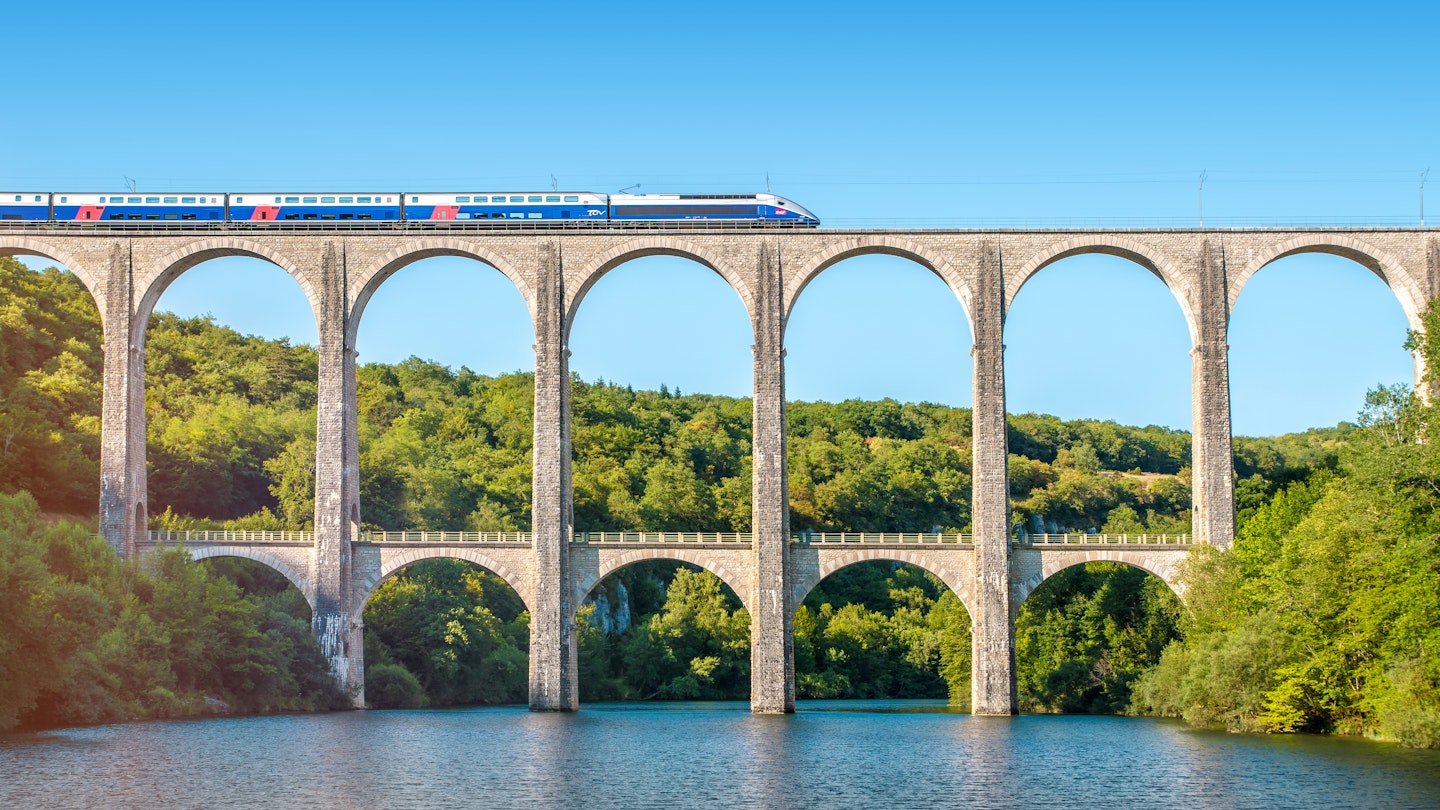Eco-Friendly Transportation in France
With cyclists in the French capital outnumbering carbon-spewing motorists, and short-haul domestic flights outlawed in 2023, getting around la belle France has never been so green.
In the 1980s, France’s emblematic TGV (train à grande vitesse or high-speed train) turned heads. Now, its widespread green mobility—spearheaded by an eco-smart capital city stitched together with 900-odd miles of cycling lanes and rural landscapes teeming with breathtaking hiking, biking, and e-biking trails—is making waves. France’s ambitious drive toward carbon neutrality for land transport by 2050 is commendable.
The Convenience of Trains
Away from cities and towns, motoring remains one of the most convenient ways to cruise through France’s magnificent kaleidoscope of châteaux, farmsteads, wineries, and picturesque villages. However, filling up in France is more expensive than the European average, and you may have to pay tolls to use the country’s sleek network of autoroutes (highways).
Nevertheless, traveling around by train—be it state-of-the-art speedy trains or gloriously slow ones—has never lost its charm. In the Alps, Pyrenees, and other mountainous areas, a fleet of cable cars and funiculars invite travelers to scale fabulous new heights. Bon voyage!
Ride the Rails to Soak Up Stunning Scenery
Exploring the celebrity French Riviera by slow train, traversing through the stunning landscapes towards the longest glacier, or enjoying the vibrant views aboard a millennia-old reincarnation of the mythical Bleu Train: train journeys in France are always breathtakingly scenic.
Frequent, reliable, and affordable trains operated by state railways cover much of the country. Principal rail lines radiate from Paris like wheel spokes, making it easy to connect between towns though some trips may require a change of trainline and station. High-speed TGV trains effortlessly cover long-distance routes—taking just over two hours to reach Bordeaux from Paris and three hours to reach Marseille, but booking in advance is advisable to secure cheaper fares.
Rent a Car to Explore Rural France
With limited public transport options, renting a car is often the best choice for exploring rural areas such as the French Alps, Pyrenees, Lot, Dordogne, and Auvergne. Many charming accommodations can be found within vineyards or down isolated country lanes.
Visit major rental outlets at airports and train stations in larger towns, many of which offer electric vehicles. It’s wise to reserve in advance during peak seasons from July to August and from December to March. To save on rental costs, consider using an online car-rental platform.
Rental cars picked up in winter at airports in Grenoble, Lyon, and Geneva will be automatically fitted with winter tires, as required by law in mountainous areas. Be aware of the unique priorité au droite rule in France, which gives priority to traffic entering an intersection from the right.
Cruise on a Budget with Rideshare
If you prefer not to drive, you can share fuel costs by ridesharing with another motorist. Covoiturage has been a common practice in France, and finding a ride through a rideshare app is relatively easy. This way, you can also practice your French!
Many French cities offer public car-sharing schemes as well. For instance, you can zip around Paris on an electric moped or access self-service electric cars in cities like Lyon, Avignon, and Nice.
Travel Afloat: Ferries and Boats
Don’t miss the chance to explore the Dordogne, Lot, or Toulouse while relaxing on deck, sipping chilled rosé as you float along the serene Canal du Midi. Burgundy, the Camargue, the Loire Valley, and Brittany are other incredible regions for canal and river boating adventures.
Explore on Two Wheels
Cycling has gained immense popularity in France, particularly with the rise of electric bikes, dedicated cycling paths, and themed itineraries focusing on wine, wildlife, and stunning landscapes. Cities like Paris, Lyon, and Marseille feature public bike-sharing options that make urban cycling enjoyable.
Accessibility in France
Despite the challenges posed by cobbled streets and steep villages, progress is being made to enhance accessibility in transportation across France. Paris has a robust network of accessible city buses; however, the metro system remains largely inaccessible. Airports also provide assistance services for travelers with mobility challenges.
In conclusion, whether you choose to travel by train, rent a car, rideshare, sail, or cycle, exploring France offers an array of eco-friendly transportation options to enjoy its stunning scenery and rich culture.




